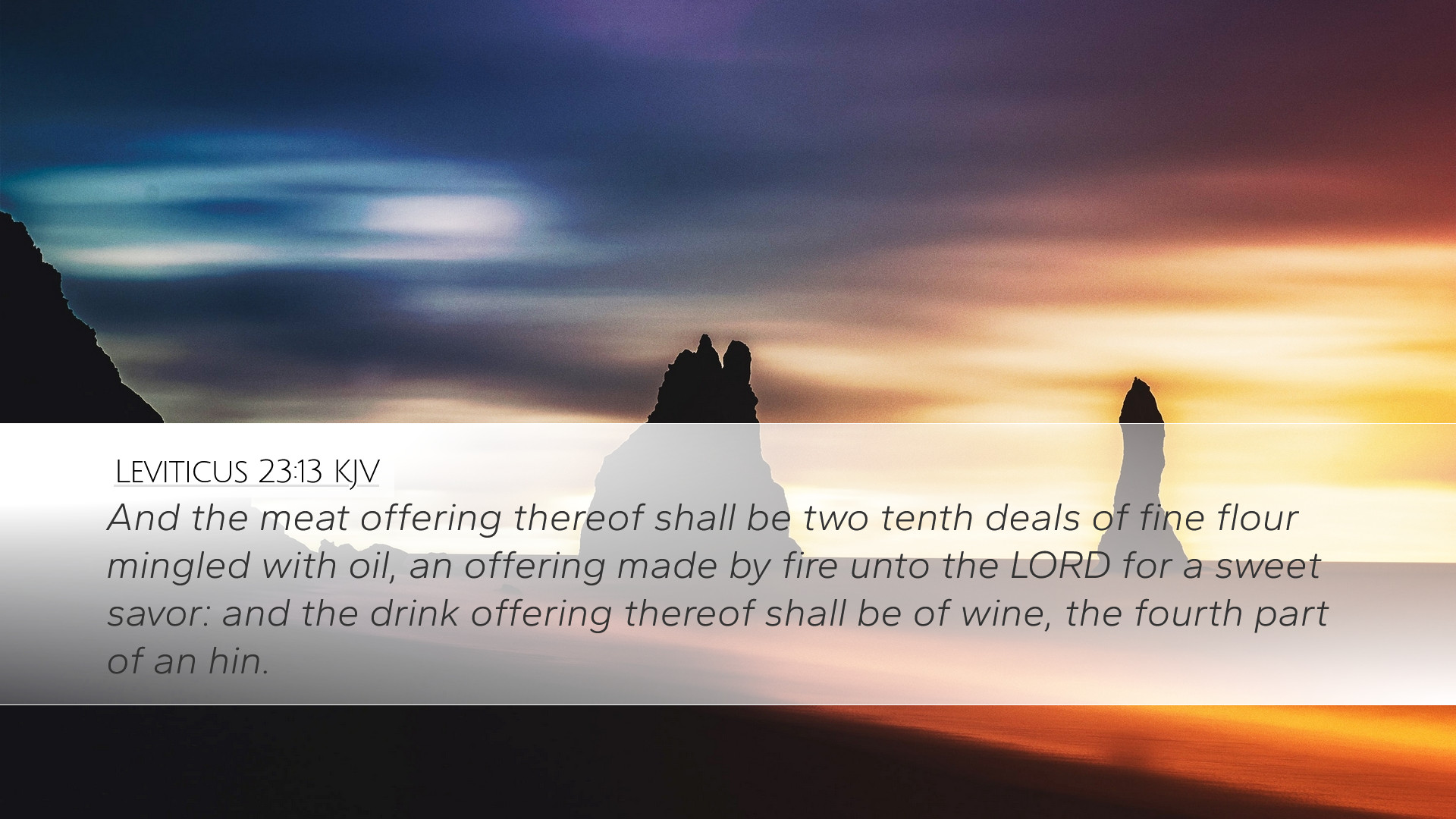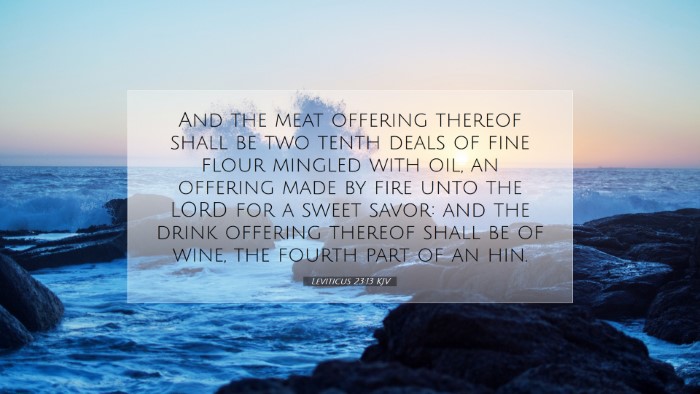Commentary on Leviticus 23:13
Verse: And the meat offering thereof shall be two tenth deals of fine flour mingled with oil, an offering made by fire unto the LORD for a sweet savour.
Introduction
The book of Leviticus serves as a vital guide for the Israelite community following their exodus from Egypt. Within its pages, various laws, rituals, and directives are laid out to promote holiness among the people of God. Leviticus 23 particularly focuses on the appointed feasts of the Lord, one of which is the Feast of Weeks, also known as Pentecost. This verse details the specific requirements for the grain offering associated with this feast, emphasizing the significance of offerings in expressing devotion and worship to God.
Context of Leviticus 23:13
This verse is part of a larger passage that outlines the various celebrations instituted by God. The Feast of Weeks occurs fifty days after Passover and serves as a time of thanksgiving for the ingathering of the harvest. It's essential to note that these instructions carry profound implications for understanding worship and offerings in the Old Testament context.
The Importance of Offerings
Matthew Henry highlights the integral role that offerings play in the covenant community's relationship with God. The grain offering mentioned in verse 13 is a means of acknowledging God's provision. By including flour mingled with oil, it symbolically represents the sustenance and blessing provided by God. Oil, a symbol of the Holy Spirit, reinforces the notion that all offerings must be made with a heart attuned to divine presence.
Spiritual Significance
- The offering serves as a symbol of dedication. Just as the Israelites were to offer fine flour, believers today are called to bring their best to the Lord (cf. Malachi 1:8).
- It points to the necessity of preparation. The meticulous instructions reflect an attitude of reverence and seriousness in worship. Pastors should encourage congregants to approach God with intentionality and purity of heart.
- The concept of a sweet savor emphasizes God’s pleasure. Adam Clarke notes that the fragrance of such offerings is acceptable to the Lord, symbolizing the believer’s prayers and actions that are pleasing in God’s sight.
Detailed Analysis of the Components
Fine Flour
Fine flour is mentioned as the primary component of the offering. Albert Barnes stresses that it represents the best quality of the harvest, indicating that offerings should reflect the giver's commitment to excellence for God's glory. This could serve as a model for contemporary believers to give generously and sacrificially, upholding the principle of stewardship.
Oil
The addition of oil signifies the anointing and the pleasure of God. Oil, often linked to the presence of the Holy Spirit, indicates that worship must not only be formal and ritualistic but also filled with spiritual fervor. The mix of oil speaks to the believer's reliance on God's Spirit in every act of worship and service.
Made by Fire
The act of burning the offering was crucial, as it transformed the gift into a sacrificial offering 'made by fire.' This speaks to the purifying aspect of fire, which serves two purposes: it consumes the offering while simultaneously elevating it as a fragrant sacrifice to God. This captures the dual nature of God's demands—sacrifice requires both surrender and transformation.
Applications for Modern Worship
- Preparation for Worship: Just as the Israelites prepared their offerings meticulously, today’s worshippers must prepare their hearts and lives for meaningful encounters with God.
- Holistic Offering: The command to offer fine flour mingled with oil serves as a reminder that we should approach God holistically—spiritually, emotionally, and physically engaged in our worship.
- The Role of Sacrifice: Cultivating a sense of sacrifice in offerings reflects our understanding that true worship comes at a cost, an idea heavily emphasized through the prescribed sacrifices in Leviticus.
Conclusion
Leviticus 23:13 encapsulates essential themes surrounding the nature of offerings and worship. By examining the specifics of the grain offering, we encounter deeper truths about dedication, preparation, God’s presence, and the joyful responsibility of worship. For pastors, students, theologians, and scholars, this passage serves as a reminder of the enduring principles of devotion, the necessity for purity in worship, and the significance of offering oneself wholly to God.


